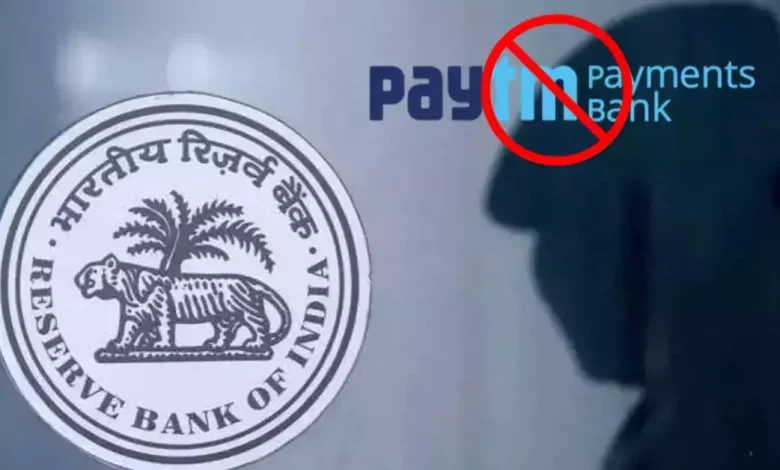Daily Current Affairs for UPSC
Reserve Bank of India (RBI) has taken action against Paytm Payments Bank
Syllabus: Indian Economy[GS Paper-3]

Context:
- The Reserve Bank of India has prohibited Paytm Payments Bank from accepting new deposits and conducting credit transactions starting in March 2024. This effectively restricts the bank’s ability to offer its main services, such as accounts and wallets. Although the bank’s licence has not been cancelled, its operations will be significantly limited.
Key Points:
- The Reserve Bank of India (RBI) has instructed Paytm Payments Bank to halt the acceptance of money in any customer account, including wallets and other prepaid instruments, starting from March 1.
- The RBI stated that this action is due to ongoing non-compliance and significant concerns regarding supervision, which require additional supervisory measures.
Details about Payments Bank:
- In 2014, the Reserve Bank of India established the Payments Bank in accordance with the suggestions of the Nachiket Mor Committee. The purpose of this bank was to operate on a smaller scale and have minimal credit risk. There are currently six Payment Banks in India, including Airtel Payment Bank, India Post Payment Bank, Fino, Paytm Payment Bank, NSDL Payment Bank, and Jio Payment Bank.
Purpose:
- The primary goal is to promote financial inclusivity by providing banking and financial services to areas with limited access. Its purpose is to assist migrant workers, low-income families, and small business owners, among others.
Key aspects:
- These banks are specialised and do not offer a wide range of services. They operate on a smaller level and require a minimum paid-up capital of Rs. 100,00,00,000.
- The promoter must contribute at least 40% of the initial equity capital for the first five years of the bank’s operation.
What is stated in the RBI direction?
- The Reserve Bank of India (RBI) has prohibited Paytm Payments Bank from offering several important services, including accepting deposits, top-ups, and various payment instruments.
- The RBI has also instructed the termination of Paytm’s parent company’s nodal accounts by the end of February.
- Any pending transactions initiated before February 29 must be settled by March 15, and no further transactions will be allowed after that date.
- However, customers are still able to freely withdraw or use the funds in their Paytm accounts as long as they do not exceed their available balance.
Why did the RBI take action?
- Since 2018, Paytm Payments Bank is subject to monitoring by the RBI.
- The logic behind the recent action against Paytm was not revealed by the RBI, but it is believed that those might have to do with KYC compliance issues and IT-related challenges.
- There is no authority on the side of RBI to permit any institution or banking entity that will make depositors’ money to risk.
- Evidence from the examination revealed that RBI investigated Paytm Payments Bank and its parent firm, One97 Communications, because there were inadequate protections of information within the group.
- Additionally, there were reservations pertaining to China-based entities with indirect interest in the parent company that had access to these data.
What statement was given by Paytm in response to the RBI action?
- Following a 20% decrease in Paytm shares, One97 Communications Ltd announced that it will comply with the directions of the Reserve Bank of India (RBI) and work with the regulator to address concerns.
- The company anticipates that the RBI’s actions could have a negative impact of Rs 300-500 crore on its annual EBITDA.
- Additionally, One97 Communications will only work with other banks in the future and not with Paytm Payments Bank.
- The company’s offline merchant payment network offerings will continue as usual.
What previous measures has the RBI implemented in response to Paytm?
- First of all, these problems included the failure to determine a beneficial owner for some entities, not reviewing payout transactions cutting through regulatory balance limits and delay in reporting a cyber security incident.
- In March 2022, multiple enforcement actions were imposed on the Cosmos Bank in India by RBI for continuing with non-compliance malpractices it directed the bank to defenestrate onboarding of new customers.
- The RBI had earlier in 2018 raised issues connected with the bank’s user-acquisition procedures and even sought to account for the cosy relations between this bank and its holding firm.
- The bank was also accused of not being worth the deposit it housed and therefore overshot the limit on deposits.





.png)



